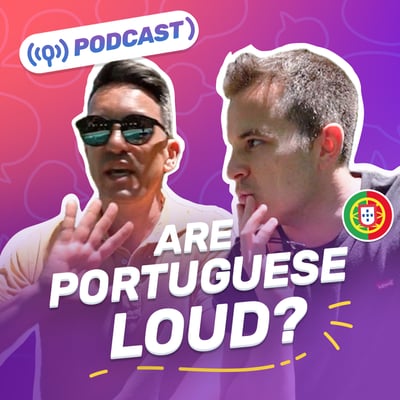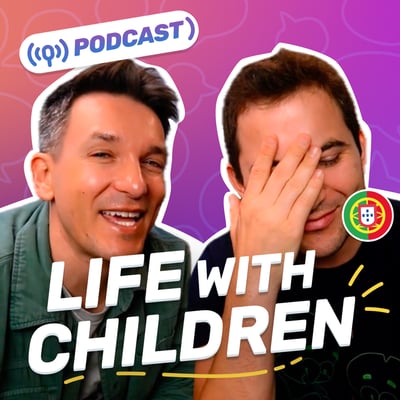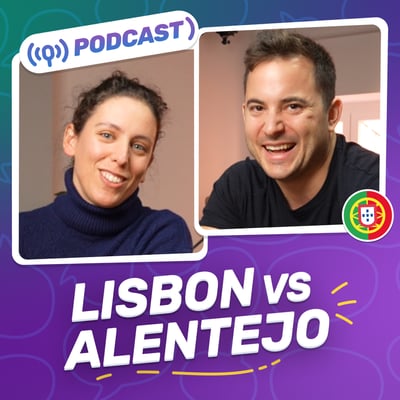Estações do Ano
Seasons of the Year
Damiana and Rui chat about what they like to do during different seasons of the year in Portugal.(Recorded in September...
Please request our permission before redistributing these files.
- Olá, Damiana. Hello, Damiana.
- Olá, Rui. Hello, Rui.
- Como estás? How are you?
- Estou bem. I'm fine.
- É a primeira vez que estamos a gravar um vídeo juntos. This is the first time we're recording a video together.
- Estamos aqui no nosso novo local de gravação, We're here in our new recording location,
- com sofá novo. with a new sofa.
- Almofadas novas. New cushions.
- Muito coloridas. Very colourful.
- E aqui o nosso amigo... And our friend here...
- O Zé. Zé.
- O Galo Zé. The Rooster Zé.
- E pensámos muito sobre o que é que íamos falar. And we thought a lot about what we were going to talk about.
- E decidimos falar sobre as... And we decided to talk about the...
- As estações do ano. The seasons of the year.
- Estações do ano. Seasons of the year.
- Quais são as estações do ano? What are the seasons?
- Então, temos a primavera. So we have the spring.
- Primavera. Spring.
- O verão. The summer.
- Verão. Summer.
- O outono. The fall.
- Outono. Fall.
- E o inverno. And the winter.
- Inverno... Winter...
- OK, as quatro estações do ano... OK, the four seasons...
- Exatamente. Exactly.
- E agora estamos no verão, And now we are in summer,
- a terminar o verão, não é? ending summer, right?
- E decidimos falar sobre o nosso verão. And we decided to talk about our summer.
- Eu queria saber como é que correu o teu verão, I'd like to know how your summer went,
- se já foste de férias, if you've already gone on vacation / on holiday,
- se ainda vais, o que é que fizeste? if you're still going, what did you do?
- Olha, eu ainda não fui de férias. Look, I haven't gone on vacation yet.
- Vou, ainda, I'm still going,
- vou em outubro de férias. I'm going on vacation in October.
- Espero que esteja calor, um pouco. I hope it will be a bit hot.
- Mas tive fins de semana, fui à praia. But I had weekends, I went to the beach.
- Fui ao Algarve I went to the Algarve
- fazer um pouco de praia, to do a bit of beach time,
- apanhar sol. to sunbathe.
- O famoso Algarve. The famous Algarve.
- Claro. Of course.
- Fui ao Alentejo também I also went to the Alentejo
- porque a minha família tem uma casa no Alentejo. because my family has a house in the Alentejo.
- Que sorte! How lucky!
- Muito bom. Very good.
- É muito quente, muito quente. It's very hot, very hot.
- Às vezes, até demasiado quente. Sometimes too hot.
- É na costa ou no interior? Is it on the coast or inland?
- No interior. Inland.
- É mesmo na fronteira com Espanha, perto. It's right on the border with Spain, close by.
- E pronto, And that's it,
- e foram as minhas férias. and (those) were my vacations.
- Foi passear, ir à praia. It was walking, going to the beach.
- Fui a dois, três festivais, concertos. I went to 2, 3 festivals, concerts.
- OK. OK.
- Então se vais de férias em outubro, So if you're going on vacation in October,
- vais no outono. É isso? you're going in the fall. Is that right?
- Exatamente. Exactly.
- Outubro já é outono. October is already fall.
- Eu tive um mês de agosto I had an August
- cheio de viagens. full of trips.
- Tive muita sorte. I was very lucky.
- Fomos duas vezes ao Algarve com as meninas. We went to the Algarve twice with the girls.
- Muito bem. Very well.
- Tivemos em Sagres. We were in Sagres.
- Ai, muito bonito. Ai, very beautiful.
- Sim, é muito lindo. Yes, it's very beautiful.
- A água é um pouco fria The water is a bit cold
- porque é uma zona do Algarve because it's an area of the Algarve
- que apanha muito vento. that gets a lot of wind.
- Mas é muito bonito com as rochas, But it's very beautiful with the rocks,
- as praias têm muitas rochas. the beaches have lots of rocks.
- E o que é que fizemos mais? What else did we do?
- Fomos acampar. We went camping.
- Acampámos duas vezes. We camped twice.
- Sim, foi muito giro. Yes, it was very nice.
- Uma vez acampámos em Montargil. We camped in Montargil once.
- Que tem uma barragem, não é? That has a dam, doesn't it?
- Sim. Yes.
- E, [da] segunda vez, acampámos na Nazaré. And the second time, we camped in Nazaré.
- Oh, Nazaré! Oh, Nazaré!
- Muito bonito, a Nazaré. Very beautiful, Nazaré.
- As meninas adoram acampar. The girls love camping.
- É divertido porque há menos regras. It's fun because there are fewer rules.
- É diferente. It's different.
- Sim, as rotinas ficam mais relaxadas Yes, the routines are more relaxed
- e elas gostam. and they like it.
- E pronto, já fiz muita coisa em agosto. And that's it, I've done a lot in August.
- Agora em setembro, se calhar, Now in September, maybe,
- ainda vou passar um fim de semana com o Joel, I'm still going to spend a weekend with Joel,
- a algum sítio... somewhere...
- Não em Portugal, mas pronto. Not in Portugal, but that's it.
- Um sítio de praia? A beach?
- De praia, sim. A beach, yes.
- Aproveitar o último... Taking advantage of the last...
- Os últimos dias de calor, The last warm days,
- no fim de setembro. at the end of September.
- Só os dois. Just the two (of us).
- Boa, muito bem. Good, very good.
- E tu gostas mais de [ir de] férias And do you like going on vacation
- para um local quente, to a warm place,
- ou preferes ir de férias para um lugar mais, or do you prefer to go on vacation somewhere more...
- mais frio, assim outono/inverno? colder, like fall/winter?
- O que é que tu preferes? What do you prefer?
- Eu gosto dos dois. I like both.
- Gosto de locais frios, I like cold places,
- com neve, por exemplo. with snow, for example.
- Acho que há muita coisa para fazer. I think there's a lot to do.
- Mas também gosto de locais quentes. But I also like warm places.
- Se tiver que escolher, acho que escolho quente. If I have to choose, I think I'll choose hot.
- Praia. Beach.
- OK. OK.
- Eu também, definitivamente. Me too, definitely.
- Se tivesse que escolher, escolheria praia. If I had to choose, I'd choose the beach.
- Gosto da areia, da água, I like the sand, the water,
- do andar com pouca roupa. going around with less clothing.
- Acho que também, em Portugal, I think that also, in Portugal,
- isso remete muito para a infância porque that is very reminiscent of childhood because
- acaba por ser uma tradição ir ao Algarve, it ends up being a tradition to go to the Algarve,
- as férias do verão. the summer vacations.
- Então, eu acho que So, I think that
- temos muitas memórias das férias do verão, we have a lot of memories of summer vacations,
- e quando acabamos por crescer, and when we end up growing up,
- gostamos também de continuar we also like to continue
- a fazer essas férias. taking those vacations.
- E tu, também? And you also?
- Também! Eu sou claramente do verão. Me too! I'm clearly a summer (person).
- Eu adoro o verão, adoro praia. I love summer, I love the beach.
- À medida que vou ficando mais velha, As I get older,
- apercebo-me que o inverno I realize that winter
- tem muitas coisas para fazer. has a lot of things to do.
- Porque quando eu era mais nova, Because when I was younger,
- eu gostava muito do verão, I loved summer,
- e ainda adoro o verão, and I still love summer,
- só que percebo que but I realize that
- o inverno também tem muitas atividades que podemos fazer. winter also has many activities that we can do.
- Nunca fiz férias na neve, mas gostava. I've never vacationed in the snow, but I'd like to.
- Gostava de esquiar, por exemplo. I'd like to go skiing, for example.
- Nunca fiz esse tipo de férias. I've never been on that kind of vacation.
- Mas quem me tira o verão... But who takes summer away from me...
- Umas férias num sítio quente, A vacation somewhere hot,
- com água quente? with hot water?
- Se calhar é porque, como país, não temos Maybe it's because, as a country, we don't have
- muita tradição de fazer desportos de inverno. much tradition of doing winter sports.
- Como não somos um país com neve, As we're not a snowy country,
- não há assim muitas atividades durante o inverno. there aren't that many activities during the winter.
- Temos muita chuva. We get a lot of rain.
- Pois é. That's right.
- E acaba por ser limitado, And it ends up being limited,
- as coisas que fazemos no inverno, não é? the things we do in winter, right?
- Associamos o inverno a estar em casa. We associate winter with being at home.
- Se calhar, os países mais a norte, Maybe countries further north,
- que têm neve e têm muitas atividades, which have snow and lots of activities,
- patinar no gelo, esquiar, ice skating, skiing,
- as pessoas já tem uma opinião diferente. people have a different opinion.
- Mas eu compreendo que para nós But I understand that for us
- o verão seja mais entusiasmante. summer is more exciting.
- Mas quando eu era mais nova, But when I was younger,
- eu costumava fazer sempre I always used to do
- quatro a cinco dias na Serra da Estrela com os meus pais. 4 to 5 days in the Serra da Estrela with my parents.
- É o único sítio em Portugal que tem neve, não é, It's the only place in Portugal that has snow, right?,
- normalmente, durante o ano. usually, during the year.
- É verdade. That's true.
- E chega a ter temperaturas até negativas. And it even reaches sub-zero temperatures.
- Não tão drástico como, por exemplo, o Canadá, Not as drastic as, for example, Canada,
- mas também temos temperaturas negativas. but we also have sub-zero temperatures.
- E eu cheguei a ir, And I got to go,
- e íamos todos os anos and we went every year
- para a Serra da Estrela. to Serra da Estrela.
- Nunca fizemos ski ou snowboard, We never went skiing or snowboarding,
- mas andávamos de trenó. but we did go sledding.
- Faziam sku? Did you do "sku"?
- Sku, exatamente! Sku, exactly!
- "Sku" é escorregar com... "Sku" is sliding with...
- O cu, com o rabo. The butt, with the bum.
- Era sempre, fazíamos sempre sku. It was always, we always did sku.
- Havia aqueles... There were those...
- Nem sei se o nome exato é trenó, mas... I don't know if the exact name is sled, but...
- É uma coisa de plástico, It's a plastic thing,
- com uma pega à frente, with a handle on the front,
- e tu escorregas... Sentas-te. and you slide down... You sit down.
- Até ao fundo. All the way to the bottom.
- Era muito engraçado, era divertido. It was very funny, it was fun.
- Se calhar, agora que és mais velha, Maybe now that you're older,
- já és adulta, you're an adult,
- também tens outra capacidade financeira, you're also more financially capable,
- já podes explorar mais destinos de frio you can explore more cold-weather destinations
- e experimentar outros tipos de férias diferentes. and try out different types of vacations.
- Gostava muito de experimentar. I'd really like to try.
- Então... Falámos aqui um pouco do verão, So... We've talked here a bit about summer,
- falámos aqui um pouco do inverno. we've talked here a bit about winter.
- Temos mais duas estações. We have two more seasons.
- Temos a primavera e o outono. We have spring and fall.
- Quando pensas em primavera, pensas em quê? When you think of spring, what do you think of?
- Olha, quando penso em primavera, Look, when I think of spring,
- primeiro penso no meu aniversário. first I think of my birthday.
- Porque eu faço anos na primavera, Because my birthday is in the spring,
- quase no verão, almost in summer,
- mas ainda é a primavera. but it's still spring.
- E penso em flores, por acaso. And I happen to think of flowers.
- Sim, começam a aparecer as flores. Yes, flowers start to appear.
- As árvores começam a florescer. The trees start to blossom.
- Sim. Yes.
- E ao mesmo tempo And at the same time
- é a estação dos pós das árvores. it's the pollen season for trees ("dusts of the trees").
- Sim, as alergias. Yes, allergies.
- O pólen. The pollen.
- Eu penso também em flores, relva... I also think of flowers, grass...
- As coisas começam a ficar mais verdes. Things start to get greener.
- Pois é. That's right.
- Os dias começam a ficar mais quentes The days start to get warmer
- e é uma altura agradável and it's a nice time
- porque já não está frio, because it's no longer cold,
- mas não está aquele calor que faz em Portugal no verão, but it's not as hot as it is in Portugal in the summer,
- que é desagradável porque começas a suar. which is unpleasant because you start to sweat.
- Então na primavera andas de T-shirt sem suar. So in spring you wear a T-shirt without sweating.
- Os dias também ficam um pouco mais compridos. The days also get a bit longer.
- É uma estação boa. It's a good season.
- É, também gosto. Yes, I like it too.
- É amena, não é? It's mild, isn't it?
- É uma estação amena, It's a mild season,
- É o que tu estavas a dizer, That's what you were saying,
- não é tão quente, it's not so hot,
- mas também não é fria. but it's not cold either.
- Em junho ainda é primavera, certo? It's still spring in June, right?
- Junho ainda é primavera. June is still spring.
- Na primavera, temos o Santo António, os Santos. In spring, we have St. Anthony, the saints.
- Os Santos Populares. The Popular Saints.
- Muito importante! Very important!
- Sim. Yes.
- [Por acaso], este ano esteve muito frio. Actually, this year it was very cold.
- Pois esteve! It really was!
- Principalmente à noite. Especially at night.
- Era impossível estar na rua sem um casaco quente. It was impossible to go outside without a warm coat.
- Estava mesmo frio! It was really cold!
- Olha, sou só eu ou tu também sentes que, Look, is it just me or do you also feel that,
- com o passar dos anos, over the years,
- parece que o verão tem ficado cada vez mais tarde? it seems that summer is getting later and later?
- Concordo. I agree.
- E mesmo quando é o pico do verão, And even when it's the height of summer,
- já não há aqueles dias there are no longer those days
- em que há calor desde manhã até à noite. when it's hot from morning until night.
- Tu lembras-te em criança, no verão, Do you remember as a child, in the summer,
- haver aqueles dias em que à noite estava calor? there were those days when it was hot at night?
- Ai, era tão bom! Oh, it was so nice!
- Saíamos sem casaco, não era preciso nada. We went out without a coat, nothing was needed.
- Estava uma temperatura agradável à noite, It was a pleasant temperature at night,
- tão bom! so nice!
- E era mais constante, ou seja, And it was more constant, that is,
- [durante] o verão inteiro estava calor. during the whole summer it was hot.
- Este ano, o verão foi fraquinho. This year, the summer was very weak.
- Foi fraquinho, também concordo. It was very weak, I agree.
- Não sei se virá ainda calor, I don't know if it will be hot again,
- mas este ano o verão but this year, summer
- foi muito pouco tempo. was very short.
- Tivemos... We had...
- Água gelada! Cold water!
- Mesmo no Algarve, Even in the Algarve,
- em que a água é um bocadinho mais quente, where the water is a little bit warmer,
- a água não estava quente. the water wasn't warm.
- Falávamos sobre isso noutro dia, We were talking about this the other day,
- com a Joana. with Joana.
- Ou é porque estamos mais velhos Or is it because we're older
- e agora estamos mais sensíveis ao frio... and now we're more sensitive to the cold?
- Em criança íamos para a água, fria ou não. As a child we used to go in the water, cold or not.
- Ou então realmente a água está mais fria. Or else the water is actually colder.
- Não sei. I don't know.
- Mas eu agora tenho muita dificuldade But now I find it very difficult
- em entrar na água... to get into the water...
- É molhar o pézinho... It's getting my little feet wet...
- O corpo todo gela. The whole body freezes.
- E depois temos o outono. And then there's fall.
- O que é que te faz lembrar, o outono? What does fall remind you of?
- Olha, o outono... Look, fall...
- Lembra-me a lareira, It reminds me of the fireplace,
- estar sentada à lareira. sitting by the fire.
- Porque começa o frio. Because the cold begins.
- A comer castanhas. Eating chestnuts.
- Castanhas, o São Martinho! Chestnuts, Saint Martin!
- As castanhas assadas, o cheiro na rua The roasted chestnuts, the smell in the street
- das castanhas assadas. of roasted chestnuts.
- Comes castanhas com manteiga Do you eat chestnuts with butter
- ou sem manteiga? or without butter?
- Experimentei uma vez com manteiga, I tried it once with butter,
- mas no geral, como gosto de comer na rua também, but in general, as I like to eat on the street too,
- então acaba sempre por ser a castanha só assada. so it always ends up being just roasted chestnuts.
- Só para esclarecer, Just to clarify,
- com manteiga é, acho eu, with butter is, I think,
- se estamos a pensar no mesmo. if we're thinking of the same thing.
- Eu aprendi há uns anos que há pessoas que colocam I learned a few years ago that some people put
- um pouco de manteiga dentro da castanha. a little butter inside the chestnut.
- É isso que estás a pensar? Is that what you're thinking (of)?
- Abrem a castanha e colocam um pouco de manteiga. They open the chestnut and put a bit of butter in it.
- Pois. OK, é isso, sim. Yes. OK, that's it, yes.
- E depois há a castanha cozida. And then there's the boiled chestnut.
- Ai, eu gosto. Ai, I like it.
- Com erva-doce. With anise.
- Eu gosto muito. I like it a lot.
- Também é bom. It's good too.
- Quando fazemos em casa, When we make it at home,
- eu peço sempre para ser que castanha cozida I always ask for boiled chestnuts
- porque gosto muito. because I like it a lot.
- E é impressão minha And is it just me
- ou a castanha cozida é mais fácil de descascar or are boiled chestnuts easier to peel
- do que a assada? than roasted ones?
- Ou não? Depende. Or not? It depends.
- Depende. It depends.
- OK. OK.
- Acho que na rua, I think in the street,
- como é para ser uma coisa rápida, as it's supposed to be a quick thing,
- a castanha assada é sempre... the roasted chestnut is always...
- Sim. Yes.
- Não achas que é sempre fácil de abrir? Don't you think it's always easy to open?
- Porque a forma como eles assam, Because the way they roast,
- a castanha descasca-se muito facilmente. the chestnut peels very easily.
- Se tentares em casa, já não é tão fácil. If you try it at home, it's not so easy.
- Não. No.
- Mas sim, castanha assada, romã... But yes, roasted chestnut, pomegranate...
- Ai, romã... Oh, pomegranate...
- Começa no verão, mas vai até ao outono. It starts in summer, but lasts until fall.
- É também o... It's also the...
- Por exemplo, o mês de outubro, For example, the month of October,
- no final do mês de outubro, at the end of the month of October,
- que é no outono, which is in the fall,
- temos o Dia das Bruxas. we have Halloween (Witches' Day).
- É, agora já começa a ser It's now becoming
- também muito popular em Portugal also very popular in Portugal
- essa tradição do Halloween, do Dia das Bruxas. that tradition of Halloween, Withches' Day.
- Eu lembro-me que, I remember that,
- muito antes de se falar no Halloween em Portugal, long before there was talk of Halloween in Portugal,
- quando eu era criança, when I was a child,
- falava-se no Pão de Deus, there was talk of "Bread of God",
- que é um pouco parecido. which is a bit similar.
- Por acaso... Actually...
- E eu cheguei a pedir às portas And I even asked at doors
- pão por Deus, for Bread for God,
- que é na mesma data. which is on the same date.
- É, nós fazíamos sempre o pão por Deus Yes, we always did Bread for God
- em que íamos bater à porta das pessoas... where we went knocking on people's doors...
- Isto no dia 1, não é? This was on the 1st, wasn't it?
- 1 de Novembro. November 1st.
- De manhã cedo, íamos bater à porta dos vizinhos Early in the morning, we'd go knocking on neighbours' doors
- pedir pão por Deus. to ask for bread for God.
- E era pão que nos davam? Não... Was it bread that they gave us? No...
- Eram doces. They were sweets.
- Às vezes, muitas pessoas tinham Sometimes, many people had
- aqueles bolos secos, bolo... those dry cakes, cake...
- Ah sim, o folar! Ah yes, the folar!
- Tipo folar, ou o bolo da noiva. Like folar, or the "bride's cake".
- Sim... Panettone. Yes... Panettone.
- Davam também... They also gave...
- As pessoas davam aquilo que tinham em casa, não é? People gave what they had at home, didn't they?
- Sim. Yes.
- É uma tradição mais portuguesa. It's a more Portuguese tradition.
- Agora, pronto, adotámos o Halloween, é diferente? Now we've adopted Halloween, it's different?
- E também há o Dia dos Mortos. And there's also the Day of the Dead.
- Que é no dia... Which is on day...
- 31. 31.
- 31, que é o Dia dos Mortos, 31, which is the Day of the Dead,
- e o dia 1 and the 1st
- é o Dia de Todos os Santos. is All Saints' Day.
- E no Dia dos Mortos, And on the Day of the Dead,
- à semelhança de países como, similar to countries like,
- por exemplo, o México, for example, Mexico,
- as pessoas visitam o cemitério people visit the cemetery
- e celebram as pessoas que morreram. and celebrate the people who have died.
- Portanto, isso é uma tradição que também So, that is a tradition that also
- era muito popular em Portugal. was very popular in Portugal.
- Sim, e a minha avó, por exemplo, Yes, and my grandmother, for example,
- nesse dia, vai sempre ao cemitério. always goes to the cemetery on that day.
- Ainda vai? Does she still go?
- Sim, sim, levar flores. Yes, yes, to bring flowers.
- Eu acho que sim, I think so,
- que a geração da minha avó também. that my grandmother's generation did too.
- A geração da minha mãe acho que já não, I don't think my mother's generation (does it),
- já se perdeu um pouco. it's lost its way a bit.
- E nós, eu acho que já não fazemos isso. And us, I don't think we do that anymore.
- Não, acho que já não. No, I don't think we do.
- Para nós é um feriado em que, For us it's a holiday when we're at home resting, isn't it?
- em que estamos em casa a descansar, não é? [[when we're at home resting, isn't it?]]
- O Dia dos Mortos em que estamos... The Day of the Dead when we're...
- Mortos de cansaço. Dead tired.
- E mais... And more...
- Deixa-me ver mais coisas que marcam as estações. Let me see, more things that mark the seasons...
- Na primavera não falámos, mas há Páscoa. In the spring, we didn't talk about (it), but there is Easter.
- Ah, pois é, muito importante. Ah, yes, very important.
- Que agora também já se começa a associar mais Which is now also beginning to be associated more
- ao coelhinho e aos chocolates, with the little bunny and the chocolates,
- mas na nossa infância era mais religioso, but in our childhood it was more religious,
- tinha uma parte mais religiosa, não é? it had a more religious part to it, didn't it?
- Tens alguma tradição de Páscoa que faças? Do you have any Easter traditions that you do?
- Com as meninas, como o Joel é do Canadá, With the girls, since Joel is from Canada,
- temos mais a tradição agora de esconder os ovos. we have more of a tradition now of hiding the eggs.
- Isso deve ser muito giro. That must be really fun.
- Porque na América do Norte isso era muito popular. Because in North America that was very popular.
- Então agora fazemos essa. So now we do that one.
- E como eu próprio não tinha nenhuma tradição, And since I didn't have any traditions myself,
- a Páscoa não era uma coisa muito celebrada em casa, Easter wasn't something that was celebrated much at home,
- em criança. as a child.
- Nunca transferi nenhuma tradição para elas. I never transferred any traditions to them.
- Mas o que é que eu me lembro da minha infância? But what do I remember from my childhood?
- O folar? The folar?
- Ai sim, o folar! Yes, the folar!
- Gostas de folar? Do you like folar?
- Eu há bocadinho falei do folar... Earlier I mentioned folar...
- Mas eu acho que estavas-te a referir [a ele], But I think you were referring to it,
- porque é um bolo que, because it's a cake that,
- não nas cidades grandes, not in the big cities,
- mas nas aldeias é muito feito but in the villages it's made a lot
- sempre que há alguma festa. every time there's a celebration.
- Então acabam por fazer esse folar So they end up making this folar
- que se chama bolo da noiva, which is called 'bride's cake',
- que se chama ferradura também. which is also called 'horseshoe'.
- É um bolo seco. It's a dry cake.
- Mas folar com aquele ovo no meio But folar with that egg in the middle
- é da Páscoa, não é? is from Easter, isn't it?
- Mas sim, lembro-me do folar na minha infância... But yes, I remember folar from my childhood...
- Lembro-me que era uma coisa religiosa I remember it was a religious thing
- da minha avó e da minha mãe. my grandmother and my mother did.
- Não sei se tinhas alguma tradição, I don't know if you had any tradition,
- quer na Páscoa, quer no Natal, either at Easter or Christmas,
- eu fazia sempre isto. I always did this.
- Estreávamos sempre roupa nova. We always debuted new clothes.
- Estrear roupa! Debuting clothes!
- A minha mãe comprava-me roupa para eu estrear. My mother used to buy me clothes to debut.
- Páscoa e Natal, é sempre a estrear roupa nova. Easter and Christmas, it's always debuting new clothes.
- Isso vem da tradição de se levar roupa nova à missa. That comes from the tradition of wearing new clothes to (Catholic) Mass.
- Exatamente, sim. Exactly, yes.
- Embora já não fossemos à missa, Although we no longer went to Mass,
- continuávamos a estrear roupa em criança. we still debuted clothes as children.
- É muito engraçado, é uma tradição It's very funny, it's a tradition
- que começou na altura dos nossos avós, de certeza, that started with our grandparents, I'm sure,
- e que eles próprios, pronto, and that they themselves, well,
- passaram de gerações para nós. Engraçado. passed down through the generations to us. Funny.
- E o carnaval, And Carnival,
- ainda é no fim do inverno ou já é na primavera? is it still at the end of winter or is it in spring now?
- É [em] fevereiro, não é? It's in February, isn't it?
- Carnaval é [em] fevereiro. Carnival is in February.
- Quer dizer, o carnaval é aquela I mean, Carnival is that
- festividade que muda. festivity that changes.
- Às vezes é em fevereiro, Sometimes it's in February,
- outras vezes é em março. other times it's in March.
- Mas nunca antes do dia 21... But never before the 21st...
- Nunca depois do dia 21 de março. Never after March 21st.
- Portanto, eu acho que calha sempre no inverno. So I think it always falls in the winter.
- Portanto, calha sempre no inverno, sim. So it's always in the winter, yes.
- Tu festejas o Carnaval? Do you celebrate Carnival?
- Agora que temos as meninas, Now that we have girls,
- festejamos o Carnaval, sim. we celebrate Carnival, yes.
- Elas acabam por ter o Halloween em que se mascaram, They end up having Halloween where they dress up,
- e o Carnaval. and Carnival.
- Costumamos dizer que o Halloween We usually say that Halloween
- é [com] coisas mais assustadoras. is with scarier things.
- Exatamente. Exactly.
- E o Carnaval é mais o que te apetecer. And Carnival is more whatever you feel like.
- É mais... It's more...
- Exuberante. Exuberant.
- Sim, liberdade total. Yes, total freedom.
- Mais coisas... More things...
- Temos no verão os festivais de música. We have music festivals in the summer.
- Pois temos, temos imensos aqui agora em Portugal. Well, we have lots of them here in Portugal now.
- Paredes de Coura, Paredes de Coura,
- NOS Alive, NOS Alive,
- Sudoeste, Sudoeste,
- o MEO... não, isso é o MEO Sudoeste. the MEO... no, that's the MEO Sudoeste.
- O Primavera Sound Fest no Porto, acho eu. The Primavera Sound Fest in Porto, I think.
- Agora temos o Kalorama, Now we have Kalorama,
- que foi agora há pouco tempo. which was just recently.
- Com K, Kalorama. With a K, Kalorama.
- Sei que é uma altura em que temos muitos concertos I know it's a time when we have a lot of concerts
- e festivais. and festivals.
- Rock in Rio. Rock in Rio.
- Rock in Rio, também. Rock in Rio, too.
- Este ano, tu foste ao Rock in Rio e eu também. This year, you went to Rock in Rio and so did I.
- Sim, nós falámos sobre isso. Yes, we talked about that.
- Até acho que fomos no mesmo dia. I think we even went on the same day.
- Sim, mas não nos vimos. Yes, but we didn't see each other.
- Mais coisas, das estações do ano... More things, about the seasons...
- [No] inverno, obviamente que temos o Natal In winter, obviously we have Christmas
- que celebra... which celebrates...
- Tu dás muita importância ao Natal Do you attach much importance to Christmas
- ou nem por isso? or not at all?
- Dou importância ao Natal I give importance to Christmas
- só pelo lado familiar, de estar com a família, just for the family aspect, to be with the family,
- porque é uma altura em que because it's a time when
- estamos todos juntos e... we're all together and...
- Só por causa disso. Just because of that.
- Porque aqui a vertente mais religiosa Because here the more religious aspect
- para a minha família, não é tão importante. for my family isn't so important.
- [Para] nós também não. Not for us either.
- É mais a questão de estarmos todos juntos It's more about us all being together ("It's more the question of...")
- e jantarmos no dia 24 and having dinner on the 24th
- e almoçarmos no dia 25. and having lunch on the 25th.
- Pronto, é isso. That's it.
- E abrem as prendas à meia-noite And do you open presents at midnight
- no final do dia 24 at the end of the 24th
- ou abrem as prendas na manhã do dia 25? or do you open them on the morning of the 25th?
- Nós abrimos as prendas na noite de 24. We open the presents on the night of the 24th.
- Ou seja, quando bate a meia-noite That is, when midnight strikes
- ou já abrem um bocadinho antes? or do you open them a little earlier?
- Meia-noite, sempre. Midnight, always.
- Abrimos as prendas, e até à meia-noite We open the presents, and until midnight
- ficamos a conversar, a jogar jogos, we chat, play games,
- a jogar às cartas, a beber chá. play cards, drink tea.
- Bebemos sempre chá, sempre. We always drink tea, always.
- Ficamos à conversa. We chat.
- Sim, a conviver. Yes, socializing.
- Isso é bom. That's good.
- Mas a minha família também não é grande. But my family isn't big either.
- Nós somos poucos. We're (just a) few.
- Somos oito, nove pessoas. We're 8, 9 people.
- É engraçado que a minha geração... It's funny that my generation...
- Quando eu digo a minha geração, When I say my generation,
- é porque tu e eu temos alguma diferença. it's because you and I have a difference.
- Eu tenho 43 [anos]. I'm 43 (years old).
- Portanto, eu acho que apanhei uma transição So I think I caught a transition
- em que o Natal ainda era sobre o Menino Jesus where Christmas was still about the Baby Jesus
- e depois, de repente, já era sobre o Pai Natal. and then suddenly it was about Santa Claus.
- Há aqui um período na minha vida, There was a period in my life
- em que eu não sei quando, in which, I don't know when,
- mas deixei de receber prendas do Menino Jesus but I stopped receiving presents from the Baby Jesus
- e passei a receber prendas do Pai Natal. and started receiving presents from Santa Claus.
- Eu não sei se apanhaste essa transição I don't know if you caught that transition
- ou se foi sempre o Pai Natal. or if it was always Santa Claus.
- Não. Quando eu era pequena, No. When I was little,
- lembro-me do Menino Jesus. I remember Baby Jesus.
- É? Eu também. Yes? Me too.
- Lembro-me do Menino Jesus, sim. I remember the Baby Jesus, yes.
- Foi numa fase em que o Natal It was at a time when Christmas
- ainda era na casa da minha avó, was still at my grandmother's house,
- porque, se calhar, a minha mãe ainda era jovem. because, perhaps, my mother was still young.
- Tinha sido mãe há pouco tempo, She had only recently become a mother,
- portanto os Natais ainda eram na casa dos meus avós. so Christmases were still at my grandparents' house.
- Quem dava prendas era o Menino Jesus Baby Jesus was (the one) who gave gifts,
- e era na chaminé and it was in the chimney
- porque a minha avó tinha uma chaminé. because my grandmother had a chimney.
- Não se falava em Pai Natal, engraçado. There was no talk of Santa Claus, funny.
- Sim, também não... Yes, not (for me) either...
- Por acaso não sei, I don't know, actually,
- esta questão toda do Pai Natal, this whole Santa Claus thing,
- como é que apareceu? how did he come about?
- Pois. Yes.
- Há ali uma transição... There's a transition there...
- Engraçado, foi uma tradição Funny, it was a tradition
- que nós absorvemos da América do Norte, that we absorbed from North America,
- esta coisa do Pai Natal. this Santa Claus thing.
- Os eventos principais do inverno são então - The main events of winter are then -
- o Natal, a passagem do ano. Christmas, New Year's Eve.
- Exatamente. Exactly.
- E o Carnaval. And Carnival.
- E o resto que acontece é... And the rest that happens is...
- Já é noutras estações do ano. It's in other seasons.
- Pelo menos as festividades mais importantes, não é? At least the most important festivities, right?
- Sim. Yes.
- Eu sinto que em Portugal I feel that in Portugal
- temos duas estações muito fortes, we have two very strong seasons,
- o verão e o inverno. summer and winter.
- E que, se calhar, a primavera e o outono And that, perhaps, spring and fall
- passam ali mais despercebidas. go by more unnoticed.
- Nós não as temos muito marcadas, acho eu. We don't have them very defined, I think.
- Ou achas que temos? Or do you think we do?
- Temos fases muito quentes no verão, We have very hot phases in summer,
- depois a primavera é mais amena, then spring is milder,
- depois o inverno é muito frio. then winter is very cold.
- Acho que há uns anos havia uma clara divisão I think a few years ago there was a clear division
- entre todas as estações do ano. between all the seasons.
- O inverno era muito frio, The winter was very cold,
- a primavera começava a aquecer, the spring would start to warm up,
- o verão era quente e depois [no] outono, the summer was hot and then in the fall,
- as folhas começavam a cair, the leaves would start to fall,
- as árvores ficavam despidas, the trees would be bare,
- e começa a vir assim um ventinho fresco. and a cool wind would start to come.
- Mas agora, acho que sinceramente, é uma misturada. But now, I think it's a mixture, honestly.
- Está mais diluído. It's more diluted.
- Agora, por exemplo, está a acabar o verão Now, for example, summer is ending
- e começou a ficar muito vento and it has started to get very windy
- e até está um pouco de frio. and it's even a bit chilly.
- Parece que passamos do verão para o inverno. It feels like we've gone from summer to winter.
- Logo! Repentino, não é? Right away! Sudden, isn't it?
- Então, vais aproveitar ainda o final do teu verão, So, you're still going to enjoy the end of your summer,
- vais de férias. you're going on vacation.
- Boas férias! (Have a) good vacation!
- Obrigada. Thank you.
- E eu também vou fazer um fim de semana And I'm also going to take a weekend
- para terminar o verão. to finish off the summer.
- E vemo-nos aqui de novo quando voltares de férias? And I'll see you here again when you get back from vacation?
- Sim? Yes?
- Cá estaremos, de novo. We will be here, again.
- Então, até à próxima e obrigado! So, until next time and thank you!
- Adeus! Goodbye!
- Tchau, tchau! Bye, bye!
- Boa Good
Vocabulary
acamparto camp agradávelpleasant amenamild, pleasant sing.,fem. aproveitarto enjoy, take advantage of, take the opportunity to, use, seize aquecerto heat, warm up as castanhaschestnuts cozidocooked, boiled descascarto peel o Dia das BruxasHalloween, Witches' Day Dia de Todos-os-SantosAll Saints' Day os doisboth, the two of them escorregarto slip, slide esquiarto ski a estaçãoseason estrearto debut, premiere, be released o feriadoholiday usually official, statutory festejarto celebrate florescerto bloom, flower, flourish folara sweet bread eaten during Easter in Portugal as fériasvacations, holidays a infânciachildhood o invernowinter a lareirafireplace meia-noitemidnight o NatalChristmas o outonoautumn a primaveraspring a PáscoaEaster suarto sweat o trenósled, sleigh, sledge o ventowind o verãosummer Expressions
de novoagain De repentesuddenly À medida queWhile, as cada vez maisincreasingly, more and more, each time more Por acasoBy chance, Incidentally, Actually, As a matter of fact ProntoOkay, All right, That's it, Ready É impressão minha ou...Is it just me or...  Damiana
Damiana Rui
Rui











